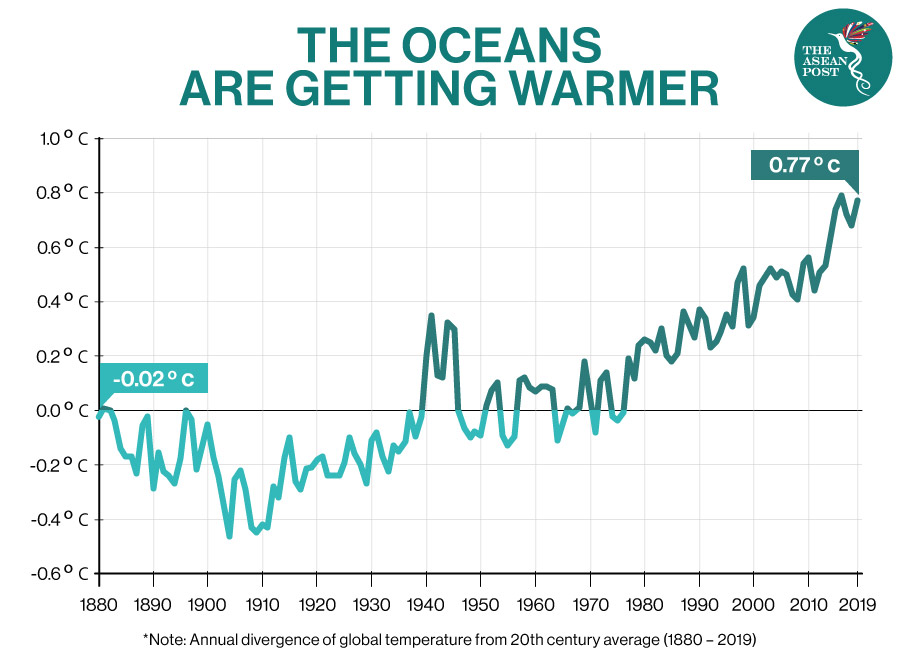Oceans cover more than 70 percent of the Earth’s surface and about 97 percent of our planet’s water is in them. Of the tiny percentage of water that is not found in our oceans – about two percent – is frozen up in glaciers and ice caps.
The World Wide Fund for Nature (WWF) noted that the oceans are a life-support system for the Earth and a global common that provide us with free goods and services, from the food we eat to the oxygen we breathe. However, oceans also absorb most of the excess heat from greenhouse gas (GHG) emissions which then leads to rising ocean temperatures.
A 2013 report by the Intergovernmental Panel on Climate Change (IPCC) revealed that oceans have been absorbing more than 93 percent of the excess heat from GHG emissions since the 1970s.
According to a recent study published in the journal, Nature Climate Change, global warming is now making our oceans more ‘stable’, increasing surface temperatures and reducing the carbon they can absorb.
Climate change has increased surface temperatures across the planet, which leads to extreme weather events such as storms, droughts and floods. But in the oceans, the researchers explained – higher temperatures have a different effect, slowing the mixing between the warming surface and the cooler, oxygen-rich waters below.
This ocean “stratification” means less deep water is rising towards the surface carrying oxygen and nutrients, while the surface of the water absorbs less atmospheric carbon dioxide (CO2) to bury at depth.
Michael Mann, the study co-author said that the “seemingly technical findings have profound and troubling implications,” that include potentially driving more “intense, destructive hurricanes” as ocean surfaces warm.
He also noted that carbon pollution could build up faster than expected in the atmosphere as the amount of CO2 absorbed reduces.
In 2019, global temperatures were 0.95 Celsius warmer than the 20th century average. Michael Byrne, Professor in Earth Surface Processes at the University of St Andrews suggests that human activity is responsible for 100 percent of this warming.

Consequences
Other than the implications mentioned briefly earlier – increasing ocean temperatures also have a negative effect on marine species and ecosystems. Rising temperatures result in coral bleaching and the loss of breeding grounds for marine fishes and mammals. Other than that, it also affects the benefits humans derive from the ocean such as food security.
"There is a severe food security risk in the tropics. No species are already activated to temperatures warmer than the tropics, so you could see a real crash in food fish populations. And these are places where coastal nations often have no other protein in the diet other than the fish from coral reefs,” said Stephen Simpson, Associate Professor in Marine Biology and Global Change at the University of Exeter.
Rising sea levels are also a major concern that has been raised by experts. When water heats up, it takes up more space – which means as oceans warm, sea levels rise. A 2019 study titled, “How fast are the oceans warming?” revealed that this effect alone could make sea levels rise 30 centimetres (cm) by the end of the century.
"That doesn't sound like much, but there are many large cities around the world, much built on reclaimed land, that are not more than 30 cm above sea level," explained Simpson. "Millions and millions of people would be displaced."
In addition, warmer oceans also tend to make tropical storms more intense and longer lasting. For coastal areas already struggling with rising seas, such storms will cause even more flooding.
Another obvious implication of warmer seas is melting sea ice. This is indeed bad news not only for animals that depend on sea ice to survive such as polar bears, but also some Arctic communities.
Recommendations
The International Union for Conservation of Nature (IUCN) has suggested a number of ways to tackle the issue of ocean warming. These include limiting GHG emissions, protecting marine and coastal ecosystems, and also restoring them. Other than that, the IUCN also cited strengthening scientific research and improving human adaptation as recommendations. For example, governments can increase investments in scientific research to monitor ocean warming and its effects, and also introduce policies to keep fisheries production within sustainable limits.
These are of course, easier said than done. However, there is an urgent need to achieve the mitigation targets set by the Paris Agreement on climate change. That will help prevent the irreversible implications of growing temperatures on ocean ecosystems and the critical functions they perform.
Related articles:
